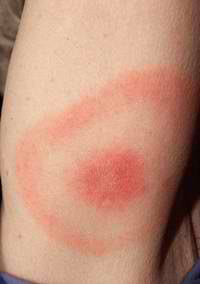Lyme disease, often referred to as the great imitator, can have an array of symptoms.

In past blogs, I have talked about how Lyme disease symptoms present differently from one person to the next. Children’s Lyme symptoms can be extremely tricky. Some children never show visible symptoms. One study of 15,000 children with confirmed Lyme disease, had about 10% of patients presenting the telltale bulls-eye rash. Both children and adults can have cognitive symptoms, which often result in a mis-diagnosis. Due to the varied symptoms of Lyme infection, many family doctors and specialists now know to have extensive testing performed on patients, whose symptoms are ambiguous. But why dentists?
Lyme disease symptoms can mimic dental pain.
The dreaded toothache. Even if you are one of the 36% of people, who is frightened of the dentist, a terrible toothache will override the fear. What if you have pain that seems to originate in or around your teeth? Pain that affects the mouth, jaw, and neck are often credited to an infected tooth. This is because tooth pain is often focused in one area, but also travels to other regions. Toothaches are caused by infected nerves, which are responsible for the traveling painful sensations we feel around our face, temple, neck, and jaw. This type of nerve pain is called neuropathy.

According to a paper on The National Library of Medicine, one patient visited her dentist and orthodontist, only to find she had no dental issues. The patient had jaw, neck, and head pain, as well as tingling sensations around and inside her mouth. She was also experiencing chills and night sweats. Her symptoms were so severe, that she eventually went to the ER, where a stroke was ruled out. The next day, upon visiting her family physician, a bulls-eye rash was found. What she believed was a toothache turned out to be Lyme disease.
What should you do if you have a toothache and neuropathy?

If you have what you believe to be a toothache, schedule a visit with your dentist ASAP. If you believe that you might have been exposed to a tick bite in recent days or weeks, tell your dentist. If you have been doing yard work, gone camping or hiking, or even visited the beach – these are all times that you could have encountered a tick.
This is not to say that every time your tooth hurts, you should be afraid you have Lyme disease, but don’t rule it out. Especially if you live in a high-risk area, like Central Mass.
Tick control is key to Lyme prevention.
 The best way to prevent Lyme symptoms that mimic dental issues is to protect yourself outdoors. Use tick protection on your skin and clothing when you go hiking or camping. Practice the 6 T’s of tick control at home, and call on a professional Cohasset tick control company to protect your yard all year long. Reputable tick control companies offer seasonal full protection barrier yard sprays, as well as tick tubes that are used in the fall and winter.
The best way to prevent Lyme symptoms that mimic dental issues is to protect yourself outdoors. Use tick protection on your skin and clothing when you go hiking or camping. Practice the 6 T’s of tick control at home, and call on a professional Cohasset tick control company to protect your yard all year long. Reputable tick control companies offer seasonal full protection barrier yard sprays, as well as tick tubes that are used in the fall and winter.
